
Using English at Work1 / UEAW_Guide
.pdf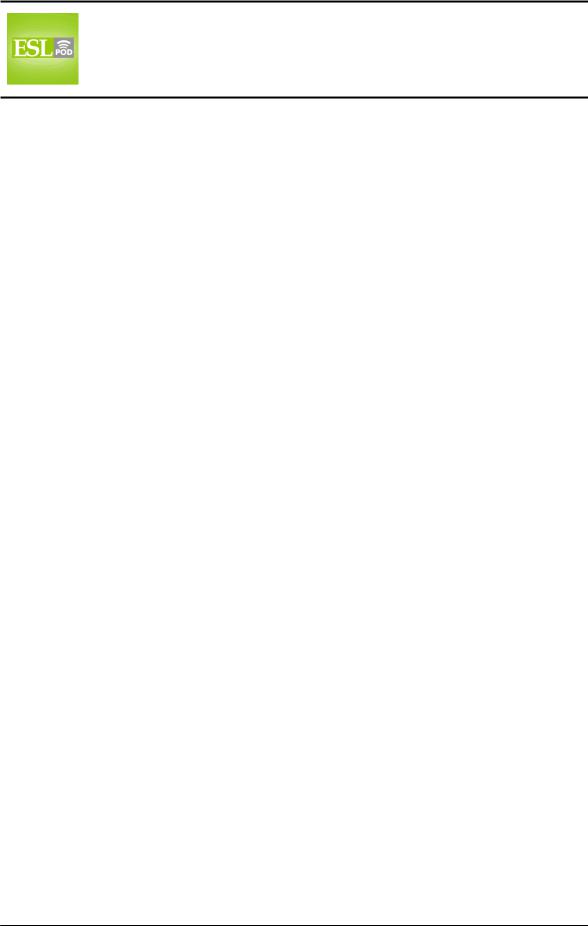
English as a Second Language Podcast
www.eslpod.com
Using English at Work
Episode 3 – Attending the Morning Meeting
COMPLETE TRANSCRIPT
Welcome to lesson three of ESLPod.com’s “Using English at Work.” I’m your host, Dr. Jeff McQuillan, from the Center for Educational Development.
In the second lesson of “Using English at Work,” we learned vocabulary for checking mail, email, and voicemail. In this third lesson, I’m going to talk about attending, or going to, a morning meeting.
Let’s listen to the story first at a slow speed.
[start of script]
I arrive at the conference room right before the meeting starts, and sit down in a chair around the large conference table. Our manager passes out a handout of the meeting agenda with some announcements and goes over some bullet points regarding old and new business.
Then, he asks each person to give a status report on his or her projects. Each of us takes turns giving a quick rundown, while everyone else listens. Of course not everyone is paying attention, since they’re thinking about their own reports and what they plan to say. Sometimes our manager will make some comments or give us some feedback, but usually there’s very little discussion.
The meeting always ends the same way. Our manager gives a short summary of how our department is doing and a little pep talk to get us motivated.
Now it’s back to our desks to do some work!
[end of script]
The story begins when I arrive, or come to, the conference room right before the meeting starts, and sit down in a chair around the large conference table. A “conference” is a type of large meeting, usually a formal meeting. A “conference room” is a large room in an office building that is used only for meetings; it’s not an office. A “conference table” is the large table inside the conference room. Conference tables are usually big, round, or perhaps rectangular tables that have chairs placed around them for the meetings. Usually the meeting leader, the person who is running the meeting, sits at one end of the conference table so everyone can see him or her.
21
These materials are copyrighted by the Center for Educational Development (2008). Posting of these materials on another website or distributing them in any way is prohibited.
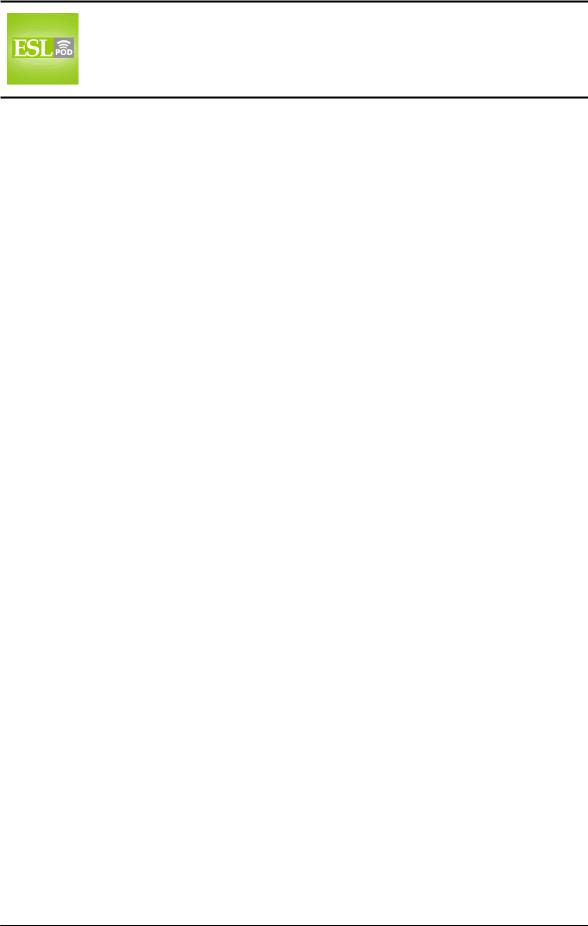
English as a Second Language Podcast
www.eslpod.com
Using English at Work
Episode 3 – Attending the Morning Meeting
After I sat down, the manager passes out a handout of the meeting agenda. A “manager” is a person who is in charge of, or responsible for, a department or a team at work. At a large company, for example, a salesperson begins working as a sales representative and, if he or she does well, might become a sales manager in a few years. If he or she continues to do well, perhaps they will later become Vice President of Sales.
At this meeting, my manager passes out a handout of the meeting agenda. A “handout” is a piece of paper that has information about the things that will be talked about during a meeting or a presentation. At the university, in the classes, the professors will often have handouts, things that they will give the students to look at that are related to their lecture or presentation. Each person at the meeting or presentation gets a copy of the handout. A presenter might give out handouts that have his or her contact information, for example, or handouts could have detailed financial information about a project. In this case, the handout is of the meeting agenda itself. An “agenda” is a plan for a meeting, showing what needs to be done, what needs to be discussed, in what order those things will be discussed. My manager’s handout of the meeting agenda is a piece of paper with a list of all the things that will be discussed during today’s meeting.
The handout has some announcements on it. An “announcement” is something that is written or said to let other people know about something. Your company president may make an announcement, saying that everyone can take Friday off
– have Friday as a vacation day. That would never actually happen; that’s just an example!
My manager goes over some bullet points on the handout. “To go over something” means to talk about something, usually a document or report. You might also go over your notes a few minutes before an exam to help yourself remember the most important things that you’ve studied – or that you didn’t study! My manager is going over some bullet points. “Bullet points” are lines of text in a document where each line begins with a small circle; sometimes it’s a diamond or an arrow. We call those “bullets.” The text usually isn’t a complete sentence, but just a short phrase. Bullet points are often easier and faster to read than long sentences because each idea is on a separate line. They’re essentially a list of something. My manager’s bullet points are about old and new business. Everything you talk about at a meeting is either old business or new business. “Old business” is everything that you talk about that was already discussed at a previous meeting – makes sense! “New business” is everything that you are going to talk about that has not yet been discussed before. Most business meetings begin with old business and end with new business. Then, of
22
These materials are copyrighted by the Center for Educational Development (2008). Posting of these materials on another website or distributing them in any way is prohibited.
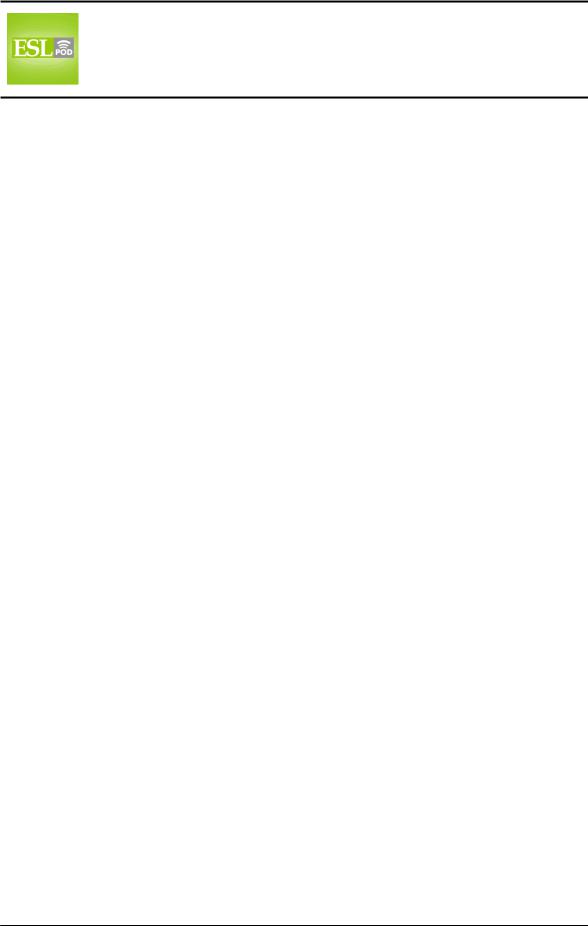
English as a Second Language Podcast
www.eslpod.com
Using English at Work
Episode 3 – Attending the Morning Meeting
course, the new business becomes the old business for the next meeting, if you still need to talk about it more.
My manager then asks each person to give a status report on his or her projects. A “status report” is a short explanation about what someone has done on a project. In this case, the manager is asking us to tell everyone else what we have done on our projects since the last time that we spoke. Some departments have weekly meetings where everyone is supposed to give a status report. At this meeting, each person takes turns giving a quick rundown while everyone else listens. “To take turns” (always plural when used as a phrasal verb, as it is in this case) means to do something one person at a time, so that first one person does something, then another, and then another until everyone in the group has finished. In a large meeting, you have to take turns talking; you can’t all talk at the same time. Sometimes husbands and wives take turns washing the dishes, meaning that one night he does it, and the next night she does it. That’s not true in my house; I do the dishes every night. I’ll have to talk to my wife about taking turns!
At my meeting, we’re taking turns giving a quick rundown. A “rundown” is a very short explanation of the most important points of something. If your boss doesn’t have time to read a long report, she might ask you to read it for her and then give her a rundown of what it’s about. It’s a brief presentation, a summary. Our status reports are quick rundowns, quick summaries of what we’ve done since the last meeting. “Rundown” (rundown) is one word.
Not everyone, however, is paying attention at the meeting. “To pay attention to something” means to listen carefully and try to understand what someone else is saying. At the meeting, some people aren’t paying attention because they’re thinking about their own status reports and what they are going to say when it’s their turn – when it’s their time to talk. Sometimes our manger makes some comments or gives us some feedback, but there’s usually not very much discussion at the meetings. “Feedback” is either positive or negative comments that are made in response to what someone has done or, in this case, said. If you write a story and ask a friend to read it and let you know what he thinks, then you are asking him to give you feedback. The idea is that feedback will help make it better. Sometimes people will write a draft of their report, give it to their colleague, and ask for feedback so they can make the report better.
Our meetings always end the same way, meaning it’s the same ending every time we meet. Our manager gives a short summary of how our department is doing. A “summary” is, as you know, like a rundown; it’s a short description of the most important points. After my manager gives a summary of how our
23
These materials are copyrighted by the Center for Educational Development (2008). Posting of these materials on another website or distributing them in any way is prohibited.
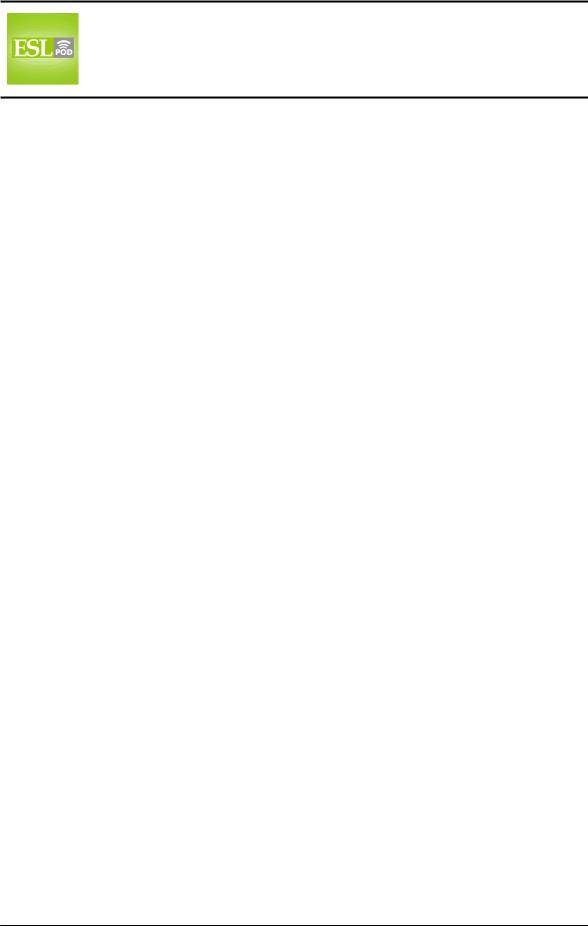
English as a Second Language Podcast
www.eslpod.com
Using English at Work
Episode 3 – Attending the Morning Meeting
departments are doing, he gives a little pep talk to get us motivated. A “pep (pep) talk” is a short speech that is supposed to encourage people, helping them to do something better, faster, or with more enthusiasm. Athletic coaches give their teams “pep talks” before important games to help the players play better, to get more excited, more enthusiastic. My manager’s pep talk is probably meant to help us feel that the work we are doing is very important for the company.
Finally, I say, “Now it’s back to our desks to do some work!” This means that the meeting is over – thank goodness – and we need to leave the conference room and return to our own desks to do the work in our regular jobs.
Now let’s listen to the description of the morning meeting again, this time at a normal speed.
[start of script]
I arrive at the conference room right before the meeting starts, and sit down in a chair around the large conference table. Our manager passes out a handout of the meeting agenda with some announcements and goes over some bullet points regarding old and new business.
Then, he asks each person to give a status report on his or her projects. Each of us takes turns giving a quick rundown, while everyone else listens. Of course not everyone is paying attention, since they’re thinking about their own reports and what they plan to say. Sometimes our manager will make some comments or give us some feedback, but usually there’s very little discussion.
The meeting always ends the same way. Our manager gives a short summary of how our department is doing and a little pep talk to get us motivated.
Now it’s back to our desks to do some work!
[end of script]
That brings us to the end of our third lesson about attending a morning meeting. In our next lesson, number four, I’m going to talk about working at my desk.
This course has been a production of the Center for Educational Development, in beautiful Los Angeles, California. Visit our website at eslpod.com.
24
These materials are copyrighted by the Center for Educational Development (2008). Posting of these materials on another website or distributing them in any way is prohibited.
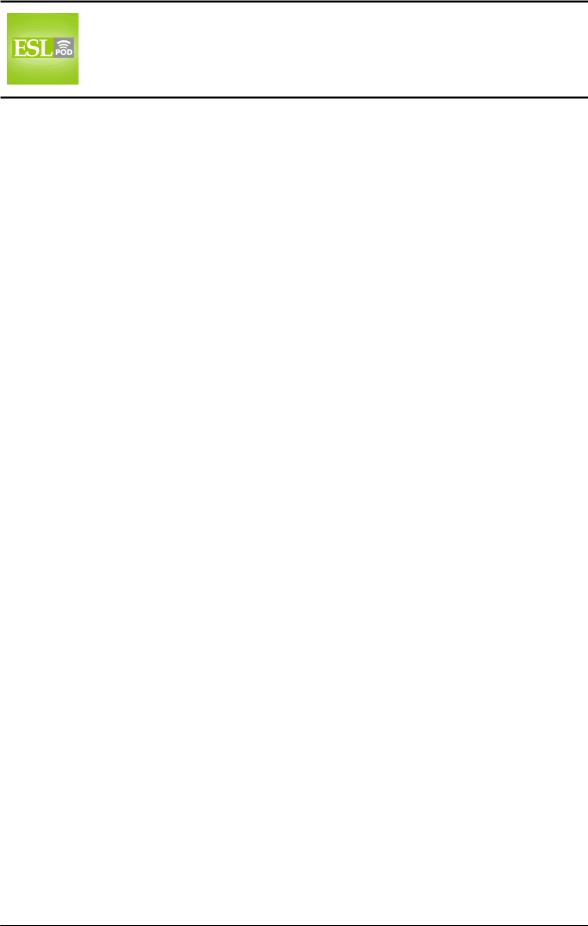
English as a Second Language Podcast
www.eslpod.com
Using English at Work
Episode 4 – Working at My Desk
SCRIPT
When I get back to my desk, I clear off a few stacks of paper on the top of my desk so I have some space to work. I open the computer file I have been working on for the past week. This document is a report that is due next week and the deadline is fast approaching.
I open my filing cabinet and take out two files and a manila envelope that has the information I need in them. I look around for the pad of paper I used to jot down some ideas yesterday, and take out the paper clips, stapler, and Scotch tape I know I’ll also need. Now I have everything in front of me so I can get down to business.
The first thing I have to do is get organized. I scan the information I have in front of me and take notes on the things I want to include in the report. Before I analyze the data for the report, I need to skim the background information to make sure I haven’t missed anything. I was making good progress but I’m feeling thirsty, so I decide to take a quick break.
_____________
GLOSSARY
to clear off – to organize and remove things from a table, desk, or other surface * Can you please clear off the table so that we can eat dinner?
stack – pile; a vertical (up and down) group of things that are placed on top of each other
* Michaela likes to read before falling asleep, so there is always a stack of books next to her bed.
file – information stored electronically under one name on a computer, CD, or USB drive
* Most of my computer files end in .doc, .xls, .ppt, or .pdf.
document – a piece of written, printed, or electronic collection of information * Remember to save the changes to your document every few minutes in case something goes wrong with your computer.
25
These materials are copyrighted by the Center for Educational Development (2008). Posting of these materials on another website or distributing them in any way is prohibited.
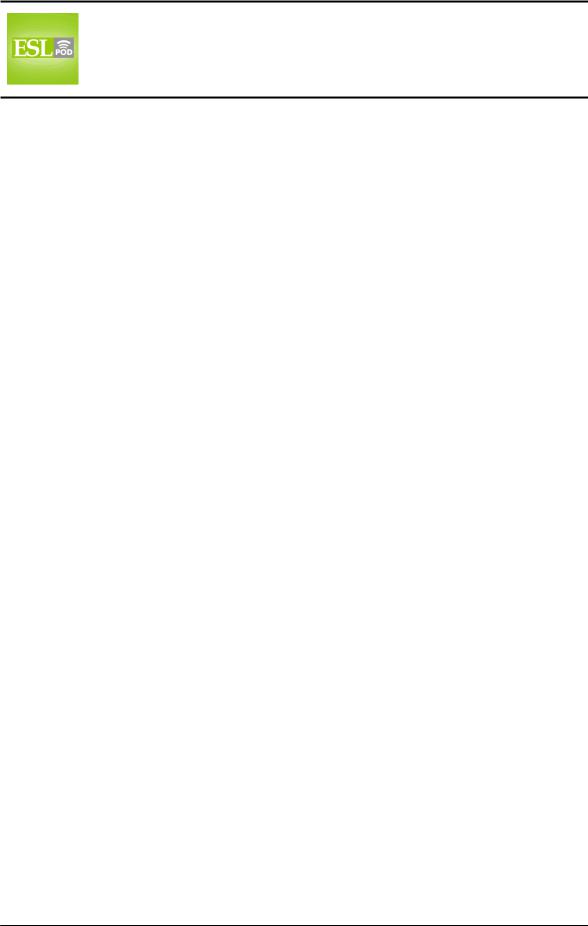
English as a Second Language Podcast
www.eslpod.com
Using English at Work
Episode 4 – Working at My Desk
deadline – the date when a project has to be finished; the date when something is due and must be turned in
* Each year, the deadline for applying to this university is March 23rd.
filing cabinet – a metal or wooden piece of furniture with large drawers that are used to hold paper files
* Could you look in the filing cabinet to see if you can find the papers we need for this case?
manila envelope – a large, yellow-colored envelope
* Please put your application in a manila envelope and mail it to this address.
pad of paper – many pieces of paper that are held together at one end * Please bring a pad of paper to the meeting so that you can take notes.
to jot down – to write something down quickly
* Quick! I need a piece of paper to jot down that phone number before I forget it.
paper clip – a small, bent piece of metal or plastic that is used to hold together pieces of paper
* Please use a paper clip so that the check doesn’t get separated from the bill that needs to be paid.
stapler – a small, metal and plastic object that, when pushed, puts a small piece of metal through pieces of paper to hold them together
* Can I use your stapler for a minute to staple these pages together?
Scotch tape – a long piece of clear plastic that is sticky on one side and is used to hold two pieces of paper together, or to put a piece of paper on something else * I need to buy some Scotch tape so that I can wrap these presents.
to get down to business – to begin working very seriously on something; to get serious about something
* Loch spent most of the morning making phone calls and talking to her colleagues, but now she needs to get down to business and finish the project.
to scan – to read something quickly, looking for the most important ideas
* Kyra scanned the newspaper, looking for articles about the baseball game.
to take notes – to write down the most important points of something that one reads or listens to
* If you go to class and take notes every day, studying for the text will be easy.
26
These materials are copyrighted by the Center for Educational Development (2008). Posting of these materials on another website or distributing them in any way is prohibited.
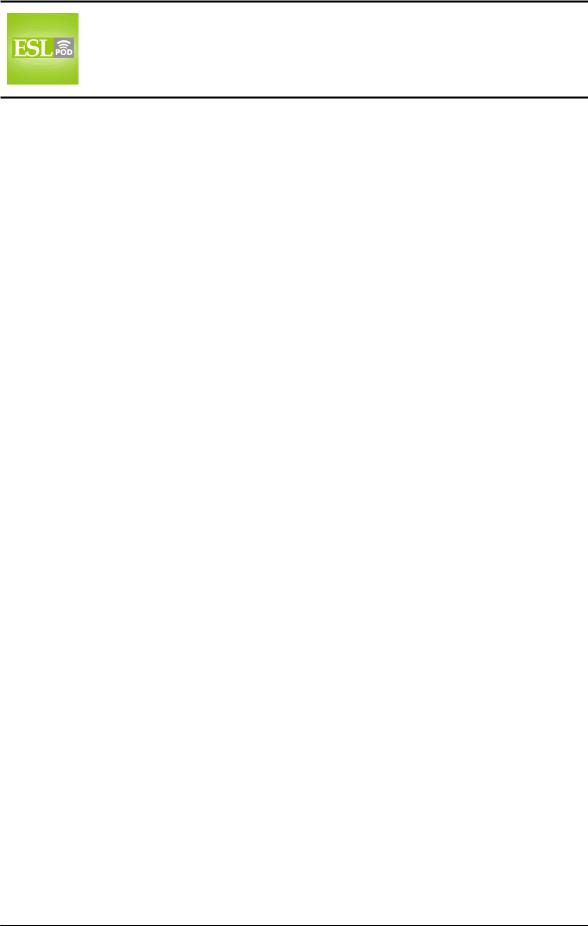
English as a Second Language Podcast
www.eslpod.com
Using English at Work
Episode 4 – Working at My Desk
to analyze – to examine something carefully, trying to understand it by looking at each part in detail
* The vice president is analyzing the sales data, trying to understand why the company sold less than expected last month.
data – information and facts, often in numbers
* We got a lot of data from the physics experiment, but now we need to figure out what it all means.
to skim – to read something quickly, looking for the most important ideas; to not read carefully
* Please skim these resumes and look for anyone who speaks German and French.
27
These materials are copyrighted by the Center for Educational Development (2008). Posting of these materials on another website or distributing them in any way is prohibited.

English as a Second Language Podcast
www.eslpod.com
Using English at Work
Episode 4 – Working at My Desk
COMPLETE TRANSCRIPT
This is lesson four of ESLPod.com’s “Using English at Work.” I’m your host, Dr. Jeff McQuillan, from the Center for Educational Development.
In the third lesson of our course, we talked about vocabulary related to a morning meeting at the office. In this fourth lesson, we’re going to learn words about working at your desk.
We’ll listen first to the story read at a slow speed.
[start of script]
When I get back to my desk, I clear off a few stacks of paper on the top of my desk so I have some space to work. I open the computer file I have been working on for the past week. This document is a report that is due next week and the deadline is fast approaching.
I open my filing cabinet and take out two files and a manila envelope that has the information I need in them. I look around for the pad of paper I used to jot down some ideas yesterday, and take out the paper clips, stapler, and Scotch tape I know I’ll also need. Now I have everything in front of me so I can get down to business.
The first thing I have to do is get organized. I scan the information I have in front of me and take notes on the things I want to include in the report. Before I analyze the data for the report, I need to skim the background information to make sure I haven’t missed anything. I was making good progress but I’m feeling thirsty, so I decide to take a quick break.
[end of script]
This story begins with me saying that when I get back, or return, to my desk, I clear off a few stacks of paper on the top of my desk so I have some space to work. “To clear off” means to organize and remove things that are covering the surface of a table, desk, or shelves. I usually like to clear off the papers on my desk at the end of the day so I have a clean desk when I return to work the next morning. In this case, I’m clearing off a few stacks of paper. At home, if you are messy like me, you may need to clear off your dining room table – that is, move your newspapers, books, and other things so that you’ll have room to eat your meal.
28
These materials are copyrighted by the Center for Educational Development (2008). Posting of these materials on another website or distributing them in any way is prohibited.
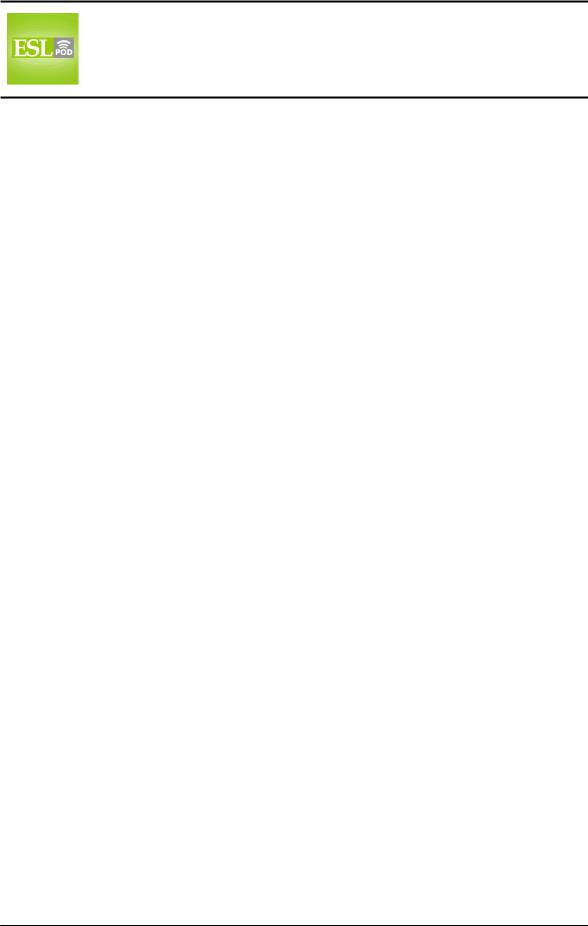
English as a Second Language Podcast
www.eslpod.com
Using English at Work
Episode 4 – Working at My Desk
I said, “I clear off a few stacks of paper.” A “stack” (stack) is a pile, or a group of things that are placed on top of each other. A “stack of papers” is many pieces of paper placed on top of each other, but we can also talk about stacks of books, stacks of coins, stacks of folded towels – all of these are stacks.
Next, I open the computer file that I’ve been working on for the past week. When we talk about papers, a “file” is a group of papers that are kept together because they’re related to the same topic. But here I’m talking about a “computer file,” which is information stored electronically on a computer, a CD, or some hard drive. This course has audio files that are stored on a computer or on a CD. When I open the computer file, I’m opening a document. A “document,” here, is the same as a computer file; it’s information stored electronically with one name on your computer or CD. We often talk about Microsoft Word documents and Excel documents. It’s something that has information on it, usually on one specific topic.
The document I’m working on is a report that is due next week and the deadline is fast approaching. A “deadline” is the date when something must be finished. My report is due next week, meaning that the deadline is next week; I must complete it by next week. When I say the deadline is fast approaching, I mean that we have a lot of work to do in a very short period of time between now and the deadline; the deadline is “coming up soon,” we could also say. Something that is fast approaching can be something positive or negative. If your birthday is next week, you may remind your friends that your birthday is fast approaching. Depending on old you are, this is a good thing or a bad thing!
Next, I open my filing cabinet. A “filing cabinet,” sometimes called a “file cabinet,” is a piece of furniture usually made of wood or metal that has large drawers that are used to hold paper files. Most office desks have a file cabinet, but there are also separate file cabinets that are not part of a desk. The documents in filing cabinets are usually organized alphabetically, from the letter A to the letter Z, or by date, or by some other way that is logical so that the files are easy to find. Or, if you’re like me, you have no system and your files are impossible to find!
I open the filing cabinet and take out two files and a manila envelope that has the information I need in them. A “manila envelope” is a large, yellow-colored envelope (notice we can say “envelope” or “envelope”) made from thick paper. In the United States, most envelopes are small and white. We use these to send letters, usually. But larger envelopes are often manila envelopes that are yellow. These envelopes are usually the size of a piece of paper and let you send things in one package without folding them. For the report, the information I need is inside two files and in a manila envelope.
29
These materials are copyrighted by the Center for Educational Development (2008). Posting of these materials on another website or distributing them in any way is prohibited.
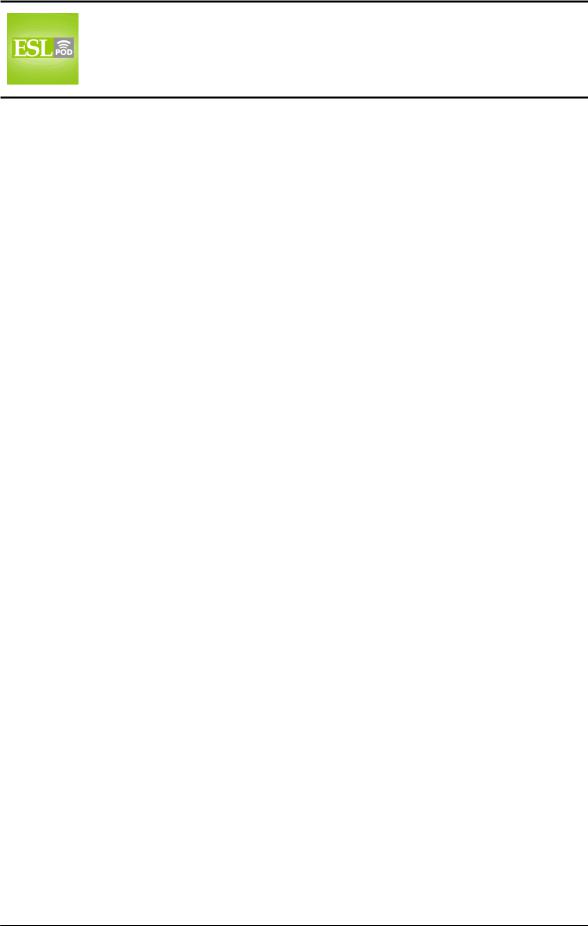
English as a Second Language Podcast
www.eslpod.com
Using English at Work
Episode 4 – Working at My Desk
The next thing I do is look around, or search, for a pad of paper. A “pad of paper” is many pieces of paper that are held together at one end. After you’ve finished writing on one page in the pad of paper, you can tear it off and still have the rest of the pad of paper to use. The pad of paper I’m looking for is one that I used to jot down some ideas yesterday. “To jot (jot) down” means to write something down quickly. You might jot down notes while you listen to someone on the phone, or you might jot down a phone number that you see in an advertisement.
Next, I take out the paper clips, stapler, and Scotch tape I know I’ll also need. A “paper clip” is a small piece of bent metal or plastic that holds pieces of paper together temporarily. When you remove the paper clip, the pages are no longer together. A “stapler” is a small object that pushes a small piece of metal through pieces of paper to hold them together. A paper clip is a good choice when you need to hold the papers together for only a little while, because it can be removed easily and doesn’t damage the papers. A stapler, on the other hand, is good for papers that need to be held together for a long time, because staples (small pieces of metal) are more difficult to remove and they leave two small holes in each piece of paper. The third thing I take out is the Scotch tape. “Tape” is a narrow piece of plastic that is sticky on one side and can be used to hold things together. “Scotch tape” is a type of tape that is clear and colorless, meaning it does not have a color. We use Scotch tape to put papers on the wall, to wrap presents, or just to put two pieces of paper together. Paper will often rip, or tear, when Scotch tape is removed from it, so we have to be careful what we put it on.
Once I’ve found the pad of paper, paper clips, stapler, and Scotch tape, I have everything in front of me so I can get down to business. The phrase “to get down to business” means to begin working on something very seriously, or to get serious about something. So far I have been gathering all the things I need, but now it’s time to get down to business and begin working on the report. If you invite your friends to your house, for example, to help you plant a new garden, when everyone has arrived, you may say, “Let’s get down to business,” meaning let’s being working now. Those would be some very nice and very generous friends!
But the first thing I have to do is to get organized. I scan the information I have in front of me. “To scan” means to read something quickly, looking for the most important ideas. You probably scan web pages or long articles in the newspaper, and perhaps advertisements to find the information that interests you, because reading the whole thing would take too long. While I’m scanning
30
These materials are copyrighted by the Center for Educational Development (2008). Posting of these materials on another website or distributing them in any way is prohibited.
